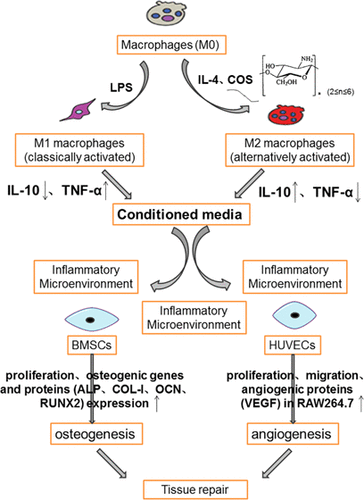当前位置:
X-MOL 学术
›
ACS Biomater. Sci. Eng.
›
论文详情
Our official English website, www.x-mol.net, welcomes your
feedback! (Note: you will need to create a separate account there.)
Macrophage Polarization Mediated by Chitooligosaccharide (COS) and Associated Osteogenic and Angiogenic Activities
ACS Biomaterials Science & Engineering ( IF 5.4 ) Pub Date : 2020-02-10 , DOI: 10.1021/acsbiomaterials.9b01550 Xiuhong Huang 1 , Meng Chen 1 , Haoming Wu 1 , Yanpeng Jiao 1 , Changren Zhou 1
ACS Biomaterials Science & Engineering ( IF 5.4 ) Pub Date : 2020-02-10 , DOI: 10.1021/acsbiomaterials.9b01550 Xiuhong Huang 1 , Meng Chen 1 , Haoming Wu 1 , Yanpeng Jiao 1 , Changren Zhou 1
Affiliation

|
The host response to implanted biomaterials can influence the functionality of the materials and modulate the tissue repair and remolding. Macrophages, key cells in the host response to biomaterials, can be polarized into different phenotypes, which are important in regenerative medicine. The objective of this study was to evaluate the effect of chitooligosaccharide (COS) on the modulation of macrophage (RAW 264.7) polarization and the associated osteogenic and angiogenic activities. The results demonstrate that COS can shift the macrophage response to an alternatively activated reparative response, which can then upregulate the expression of anti-inflammatory cytokines. COS can also create an immune-modulated microenvironment, with osteogenesis- and angiogenesis-related proteins and a biological process that further influences the osteogenic/angiogenic differentiation and promotion of bone mesenchymal stem cells (BMSCs) and vascular activation of human umbilical vein endothelial cells (HUVECs). In this work, at a low concentration of 4 μg/mL [COS(4)] and suitable polymerization degree of 5 (chitopentaose hydrochloride, COS5) of COS, the associated effect on an alternatively activated reparative response and upregulation of anti-inflammatory cytokine expression was better than that of COS at other concentrations or polymerization degrees. The supernatant from a culture of RAW 264.7 stimulated by COS(4) and COS5 [conditioned medium S-COS(4) and S-COS5] contained more osteogenesis- and angiogenesis-related proteins like DKK-1, OPN, osteoactivin, vascular endothelial growth factor (VEGF) R1, epidermal growth factor (EGF), and insulin-like growth factor binding protein-5 (IGFBP-5) for regulation of osteogenesis/angiogenesis. Specifically, the alkaline phosphatase (ALP) activity and typical osteogenesis-related proteins of BMSCs were significantly influenced by the conditioned media of COS-stimulated macrophages [S-COS(4) and S-COS5]. Furthermore, the conditioned media affected HUVEC proliferation and migration for vascularization. Our results suggest that COS at a low concentration and suitable polymerization degrees has a beneficial effect on immunity modulation (an alternatively activated reparative response) and can modulate osteogenesis/angiogenesis processes for tissue regeneration without using any inductive agent.
中文翻译:

壳寡糖(COS)介导的巨噬细胞极化和相关的成骨和血管生成活性
宿主对植入的生物材料的反应会影响材料的功能,并调节组织的修复和重塑。巨噬细胞是宿主对生物材料反应的关键细胞,可以极化为不同的表型,这在再生医学中很重要。这项研究的目的是评估壳寡糖(COS)对巨噬细胞(RAW 264.7)极化调节以及相关的成骨和血管生成活性的影响。结果表明,COS可以将巨噬细胞应答转变为交替激活的修复应答,从而可以上调抗炎细胞因子的表达。COS还可以创建免疫调节的微环境,与成骨和血管生成相关的蛋白,以及进一步影响骨间充质干细胞(BMSC)的成骨/血管生成分化和促进以及人脐静脉内皮细胞(HUVEC)的血管活化的生物学过程。在这项工作中,低浓度的4μg/ mL [COS(4)]和合适的聚合度为5的COS(盐酸五味五糖,COS5),对交替激活的修复反应和抗炎细胞因子的上调具有相关作用在其他浓度或聚合度下,其表达均优于COS。COS(4)和COS5 [条件培养基S-COS(4)和S-COS5]刺激的RAW 264.7培养物中的上清液含有更多的成骨和血管生成相关蛋白,例如DKK-1,OPN,骨激活素,血管内皮生长因子(VEGF)R1,表皮生长因子(EGF)和胰岛素样生长因子结合蛋白5(IGFBP-5)用于调节成骨/血管生成。具体而言,BMSCs的碱性磷酸酶(ALP)活性和典型的成骨相关蛋白受到COS刺激的巨噬细胞[S-COS(4)和S-COS5]的条件培养基的显着影响。此外,条件培养基影响HUVEC的增殖和迁移以用于血管形成。我们的结果表明,低浓度和合适聚合度的COS对免疫调节(交替激活的修复反应)具有有益作用,并且可以在不使用任何诱导剂的情况下调节组织再生的成骨/血管生成过程。和胰岛素样生长因子结合蛋白5(IGFBP-5)调节成骨/血管生成。具体而言,BMSCs的碱性磷酸酶(ALP)活性和典型的成骨相关蛋白受到COS刺激的巨噬细胞[S-COS(4)和S-COS5]的条件培养基的显着影响。此外,条件培养基影响HUVEC的增殖和迁移以用于血管形成。我们的结果表明,低浓度和合适聚合度的COS对免疫调节(交替激活的修复反应)具有有益作用,并且可以在不使用任何诱导剂的情况下调节组织再生的成骨/血管生成过程。和胰岛素样生长因子结合蛋白5(IGFBP-5)调节成骨/血管生成。具体而言,BMSCs的碱性磷酸酶(ALP)活性和典型的成骨相关蛋白受到COS刺激的巨噬细胞[S-COS(4)和S-COS5]的条件培养基的显着影响。此外,条件培养基影响HUVEC的增殖和迁移以用于血管形成。我们的结果表明,低浓度和合适聚合度的COS对免疫调节(交替激活的修复反应)具有有益作用,并且可以在不使用任何诱导剂的情况下调节组织再生的成骨/血管生成过程。BMSCs的碱性磷酸酶(ALP)活性和典型的成骨相关蛋白受到COS刺激的巨噬细胞[S-COS(4)和S-COS5]的条件培养基的显着影响。此外,条件培养基影响HUVEC的增殖和迁移以用于血管形成。我们的结果表明,低浓度和合适聚合度的COS对免疫调节(交替激活的修复反应)具有有益作用,并且可以在不使用任何诱导剂的情况下调节组织再生的成骨/血管生成过程。BMSCs的碱性磷酸酶(ALP)活性和典型的成骨相关蛋白受到COS刺激的巨噬细胞[S-COS(4)和S-COS5]的条件培养基的显着影响。此外,条件培养基影响HUVEC的增殖和迁移以用于血管形成。我们的结果表明,低浓度和合适聚合度的COS对免疫调节(交替激活的修复反应)具有有益作用,并且可以在不使用任何诱导剂的情况下调节组织再生的成骨/血管生成过程。
更新日期:2020-02-10
中文翻译:

壳寡糖(COS)介导的巨噬细胞极化和相关的成骨和血管生成活性
宿主对植入的生物材料的反应会影响材料的功能,并调节组织的修复和重塑。巨噬细胞是宿主对生物材料反应的关键细胞,可以极化为不同的表型,这在再生医学中很重要。这项研究的目的是评估壳寡糖(COS)对巨噬细胞(RAW 264.7)极化调节以及相关的成骨和血管生成活性的影响。结果表明,COS可以将巨噬细胞应答转变为交替激活的修复应答,从而可以上调抗炎细胞因子的表达。COS还可以创建免疫调节的微环境,与成骨和血管生成相关的蛋白,以及进一步影响骨间充质干细胞(BMSC)的成骨/血管生成分化和促进以及人脐静脉内皮细胞(HUVEC)的血管活化的生物学过程。在这项工作中,低浓度的4μg/ mL [COS(4)]和合适的聚合度为5的COS(盐酸五味五糖,COS5),对交替激活的修复反应和抗炎细胞因子的上调具有相关作用在其他浓度或聚合度下,其表达均优于COS。COS(4)和COS5 [条件培养基S-COS(4)和S-COS5]刺激的RAW 264.7培养物中的上清液含有更多的成骨和血管生成相关蛋白,例如DKK-1,OPN,骨激活素,血管内皮生长因子(VEGF)R1,表皮生长因子(EGF)和胰岛素样生长因子结合蛋白5(IGFBP-5)用于调节成骨/血管生成。具体而言,BMSCs的碱性磷酸酶(ALP)活性和典型的成骨相关蛋白受到COS刺激的巨噬细胞[S-COS(4)和S-COS5]的条件培养基的显着影响。此外,条件培养基影响HUVEC的增殖和迁移以用于血管形成。我们的结果表明,低浓度和合适聚合度的COS对免疫调节(交替激活的修复反应)具有有益作用,并且可以在不使用任何诱导剂的情况下调节组织再生的成骨/血管生成过程。和胰岛素样生长因子结合蛋白5(IGFBP-5)调节成骨/血管生成。具体而言,BMSCs的碱性磷酸酶(ALP)活性和典型的成骨相关蛋白受到COS刺激的巨噬细胞[S-COS(4)和S-COS5]的条件培养基的显着影响。此外,条件培养基影响HUVEC的增殖和迁移以用于血管形成。我们的结果表明,低浓度和合适聚合度的COS对免疫调节(交替激活的修复反应)具有有益作用,并且可以在不使用任何诱导剂的情况下调节组织再生的成骨/血管生成过程。和胰岛素样生长因子结合蛋白5(IGFBP-5)调节成骨/血管生成。具体而言,BMSCs的碱性磷酸酶(ALP)活性和典型的成骨相关蛋白受到COS刺激的巨噬细胞[S-COS(4)和S-COS5]的条件培养基的显着影响。此外,条件培养基影响HUVEC的增殖和迁移以用于血管形成。我们的结果表明,低浓度和合适聚合度的COS对免疫调节(交替激活的修复反应)具有有益作用,并且可以在不使用任何诱导剂的情况下调节组织再生的成骨/血管生成过程。BMSCs的碱性磷酸酶(ALP)活性和典型的成骨相关蛋白受到COS刺激的巨噬细胞[S-COS(4)和S-COS5]的条件培养基的显着影响。此外,条件培养基影响HUVEC的增殖和迁移以用于血管形成。我们的结果表明,低浓度和合适聚合度的COS对免疫调节(交替激活的修复反应)具有有益作用,并且可以在不使用任何诱导剂的情况下调节组织再生的成骨/血管生成过程。BMSCs的碱性磷酸酶(ALP)活性和典型的成骨相关蛋白受到COS刺激的巨噬细胞[S-COS(4)和S-COS5]的条件培养基的显着影响。此外,条件培养基影响HUVEC的增殖和迁移以用于血管形成。我们的结果表明,低浓度和合适聚合度的COS对免疫调节(交替激活的修复反应)具有有益作用,并且可以在不使用任何诱导剂的情况下调节组织再生的成骨/血管生成过程。











































 京公网安备 11010802027423号
京公网安备 11010802027423号